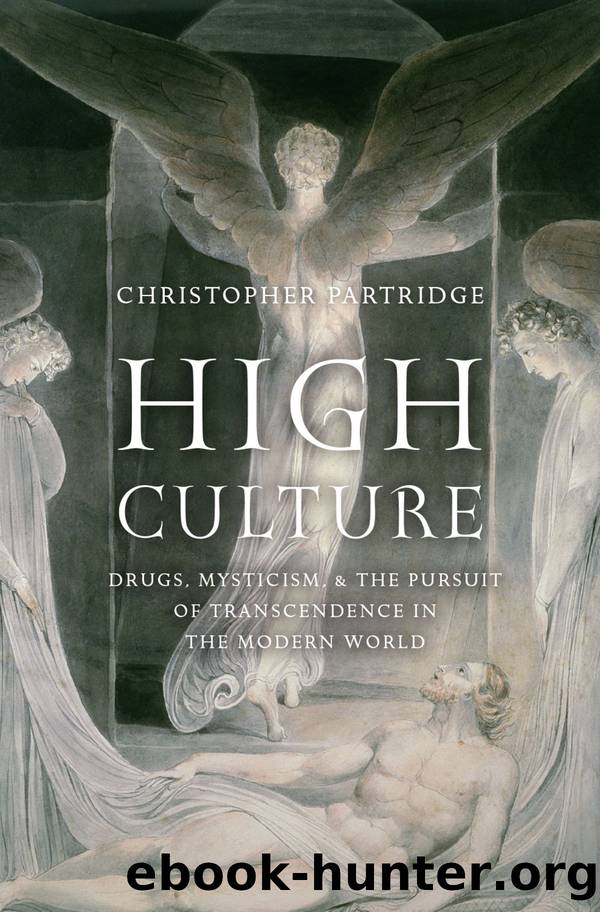High Culture by Partridge Christopher;

Author:Partridge, Christopher;
Language: eng
Format: epub
Publisher: Oxford University Press, Incorporated
Published: 2018-06-15T00:00:00+00:00
Concluding Comments
The cultural ripples caused by the impact of The Doors of Perception and, to a lesser extent, Heaven and Hell became waves by the dawn of the 1960s. Many aspiring mystics, typically working with Buddhist and Hindu ideas, agreed with Huxley that the house need not be burned down in order to roast a pig. There was little point in following the arduous path of asceticism if a mystical state could be experienced simply by swallowing a psychedelic substance while sitting in a comfortable chair listening to oneâs favorite music. By the close of the 1950s, there was not only a burgeoning countercultural interest in Zen Buddhism, as evocatively described in Jack Kerouacâs The Dharma Bums (1959), but also a fascination with what Alan Watts referred to as âadventures in the chemistry of consciousness,â207 as discussed in the work of Allen Ginsberg and William Burroughs. There was an emerging feeling, particularly amongst young people, that, as Watts put it, âmodern chemists [had] prepared one or two substances . . . that in some cases . . . induce states of mind remarkably similar to cosmic consciousness.â208
Having said that, while Watts became an enthusiastic advocate of Huxleyâs thesis, he had initially expressed concerns similar to Zaehnerâs about spiritual shortcuts: âFor one thing, mystical experience seems altogether too easy when it simply comes out of a bottle, and is thus available to people who have done nothing to deserve it, who have neither fasted nor prayed nor practiced yoga. For another, the claim seems to imply that spiritual insight is after all only a matter of body chemistry involving a total reduction of the spiritual to the material.â However, as noted in Chapter 1, he decided that while âthese are serious considerations,â it needs to be understood that âthe difficulty is found to rest upon semantic confusion as to the definitions of âspiritualâ and âmaterial.âââ209 In other words, the public concern about psychedelics rests on a false opposition of spirit and matterâone of the principal themes of his work. As with Huxley and some of the principal currents of the 1960s psychedelic revolution, his overall point was that âthe use of such chemicals does not reduce spiritual insight to a mere matter of body chemistry.â Indeed, âeven when we can describe certain events in terms of chemistry this does not mean that such events are merely chemical.â210 Brain chemistry, altered states of consciousness, and spiritual experiences are fundamentally related. In response to criticisms such as those of Zaehner, he argued that we need at least to consider the possibility that âsome of the chemicals known as psychedelics provide opportunities for mystical insight in much the same way that well-prepared paints and brushes provide opportunities for fine painting, or a beautifully constructed piano for great music.â211
Download
This site does not store any files on its server. We only index and link to content provided by other sites. Please contact the content providers to delete copyright contents if any and email us, we'll remove relevant links or contents immediately.
| Baha'i | Cults |
| Demonology & Satanism | Eckankar |
| Egyptian Book of the Dead | Freemasonry |
| Messianic Judaism | Mysticism |
| Scientology | Theism |
| Tribal & Ethnic | Unitarian Universalism |
The Four Agreements by Don Miguel Ruiz(6765)
Breaking Free by Rachel Jeffs(4218)
The Hatha Yoga Pradipika (Translated) by Svatmarama(3342)
120 Days of Sodom by Marquis de Sade(3275)
Member of the Family by Dianne Lake(2352)
The Tao of Physics by Fritjof Capra(2276)
The Psychedelic Gospels: The Secret History of Hallucinogens in Christianity by Jerry B. Brown(2158)
The Road to Jonestown by Jeff Guinn(2066)
Going Clear: Scientology, Hollywood, and the Prison of Belief by Lawrence Wright(1985)
Going Clear by Lawrence Wright(1968)
Uriel's Machine by Christopher Knight(1899)
The Grand Grimoire: The Red Dragon by Author Unknown(1813)
The Gnostic Gospel of St. Thomas by Tau Malachi(1799)
Key to the Sacred Pattern: The Untold Story of Rennes-le-Chateau by Henry Lincoln(1634)
Animal Speak by Ted Andrews(1626)
The Malloreon: Book 02 - King of the Murgos by David Eddings(1596)
Waco by David Thibodeau & Leon Whiteson & Aviva Layton(1560)
The New World Order Book by Nick Redfern(1551)
The Secret History of Freemasonry by Paul Naudon(1503)
